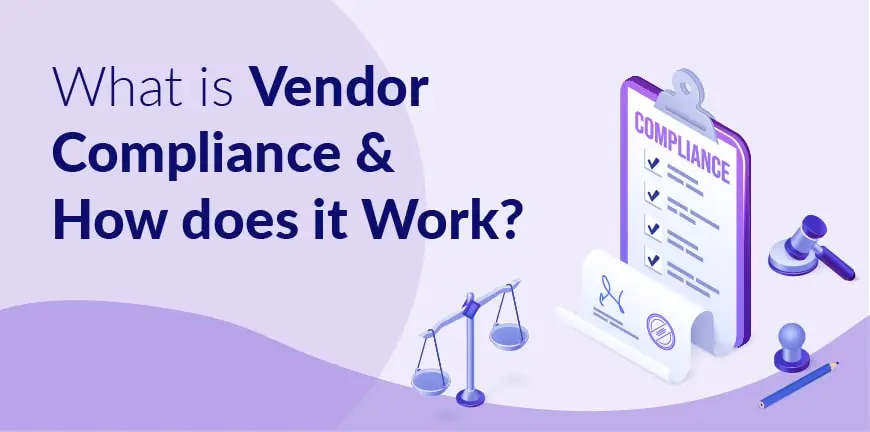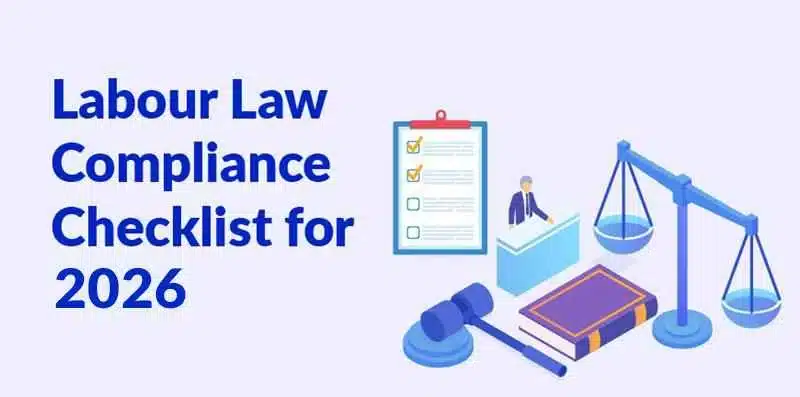
Reimagining Hospitality in the Age of AI
29/08/2024
Data Privacy vs. Data Insights: Are They Two Sides of the Same Coin?
30/08/2024Your business is as good as the products and services you sell. Vendors play a crucial role as they are the ones you purchase all your goods from, which is why vendor compliance is one of the most essential functions that you must not overlook if you want your organization’s operations to run smoothly. Managing vendors effectively can help reduce overspending and also ensure that orders go smoothly from the time of purchase to payment.
What is Vendor Compliance?
Vendor Compliance refers to the adherence to the process of making sure that all vendors (external suppliers, contractors, etc) associated with a company adhere to the company’s pre-defined standards, policies, and regulations. Vendor compliance is the easiest, most effective way of ensuring that vendors meet the requirements related to safety, quality, and other legal obligations.
Why is Vendor Compliance Important?
The absence of vendor compliance leaves you no other road to take during distress. For example, when there is a sudden price increase, late-delivered products, or dissatisfactory products, you can improve or sever the relationship and absorb the hidden and direct costs you won’t have recourse for non-compliance.
However, a perfectly drafted vendor compliance policy can help your company avoid so many problems like wrong products being sent, substituting products without approval, wrong labels, late deliveries, damaged products, etc. All of these issues will cause issues that will resonate within your entire organization and, in the end, hurt your customer service and affect your bottom line.
A well-crafted policy cannot only be used with every one of your vendors, but this can also reduce wasted time, lower warehouse, freight, and delivery costs, and increase speed and accuracy, leading to better customer service and higher customer satisfaction. A good policy can facilitate the implementation of advanced supply chain systems, no mess-ups in inventory, and RFID systems, all of which create greater efficiencies. Additionally, an effective vendor compliance program will help avoid disputes, leading to better-managed vendor relationships.
What are the Benefits of Vendor Compliance Programs?
A reliable third-party vendor compliance service provider will make sure that you have a vendor compliance program that is unique and relevant to your business needs, not only facilitating the enhancement of brand reputation but also steering clear of legal issues and financial risks.
Here are some of the major benefits of a vendor compliance program-
1. Elimination of Risks
Implementation of a Vendor Compliance Management system helps businesses reduce the risks associated with non-compliant vendors, as the program allows organizations to identify concerns associated with compliance much earlier on and take the right steps to address it by centralizing vendor data and automating compliance checks, and monitoring vendor activity in real time. This helps in improving overall compliance risk management effectiveness and greatly reduces legal fines and risks.
2. Better operational efficiency
The right vendor compliance management system streamlines and automates all vendor operations, increasing operational efficiency. This automation can help reduce the administrative burden, help allocate resources efficiently, and reduce jobs that involve performing repetitive tasks. Automated notifications and reminders of vendor compliance can help with the completion of tasks on time and foster better decision-making.
3. Fosters better relationships with vendors
Vendor Compliance best practices can help promote transparency, trust & collaboration in supplier relationships. How? With the right compliance practices in place, businesses can effectively communicate compliance needs to vendors by offering clear expectations, defined processes & performance measurements, and their role for accountability for compliance results.
Witnessing vendor performance & knowing about the status of compliance helps businesses recognize & reward top performers while also identifying areas for improvement & giving targeted assistance or training as needed. This automatically helps build better supplier relationships, encourages continual development & fosters long-term partnerships built on similar values & goals.
4. Regulatory Compliance upkeep
Vendor Compliance management systems can help with the upholding of regulatory compliance. Organizations can easily make sure that their business operations run smoothly by keeping compliance with relevant laws and industry standards by automated compliance checks and regular audits on vendor operations. This can eliminate the risk of penalties, fines and enhance brand reputation, instilling a sense of trust among stakeholders, customers, and regulatory agencies.
How to Ensure Vendor Compliance?
To ensure Vendor Compliance, it’s imperative to follow the best practices of Vendor management as well as execute the same effectively. Here are some steps you can follow to ensure vendor compliance-
- Create well-defined policies and procedures that include regulatory obligations, industry standards, and other norms. Present this to stakeholders, vendors, and workers so that everyone is on the same page and understands compliance expectations. Businesses must implement standard protocols for vendor onboarding, qualification, monitoring & performance evaluation to promote consistency & accountability in compliance management operations.
- Communicate and collaborate with the vendors to develop and build trust and transparency. You must clearly explain the compliance standards, objectives, and performance expectations to vendors, but also provide them with the required support and guidance. You may do this by conducting training sessions, encouraging feedback, and promoting conversation regarding all compliance-related issues much earlier on.
- Conduct regular audits and interviews to ensure effective compliance management as well as identify areas for improvement. This includes documentation of processes, performance metrics establishment to ensure adherence to regulatory requirements, and internal policies. This process must be carried out by a third-party auditor with expertise in vendor compliance management. Organizations must also establish processes for ongoing reviews of vendor performance & compliance status, including regular evaluations of key performance indicators [KPIs], metrics & benchmarks.
What to Include in a Vendor Compliance Policy?
Your vendor compliance policy must include clauses for areas of concern, meaning areas that could see issues while performing typical operations. Here are some of the Vendor Compliance examples that almost all companies include in their vendor management policies-
- The company’s requirements and expectations, and penalties regarding
- Cost of back orders
- Condition of the product delivered
- Dates of delivery
- Service standards
- Product packaging specifications
- Label markings on products
- Product quality relevant to requirements
- Supply chain system requirements like electronic POs (Purchase Order), direct to store or drop ship requirements, customer returns and credits, etc.
To promote compliance, you must also develop a schedule to penalize the vendors who fail to follow the standard procedures and protocols. The penalization could be based on manpower per hour or cost per infraction.
While crafting your vendor compliance policy, ensure that you are clear, concise, and precise in order to remove ambiguities and misunderstandings.
Why do you need a Vendor Compliance Partner?
A Vendor compliance partner plays a significant role in facilitating Vendor compliance management for businesses as they help maintain consistency, reliability, and efficiency in the supply chain. Non-compliance can lead to various issues, including delays, increased costs, and potential damage to the reputation of both the vendor and the buying organization.
Frequently Asked Questions
1. Why is vendor compliance management crucial?
Vendor compliance management is crucial as it ensures that vendors comply with the company standards, rules, and regulations and meet the specific requirements in terms of safety, quality, and ethical conduct.
2. What is vendor compliance?
Vendor Compliance refers to the adherence to the process of making sure that all vendors (external suppliers, contractors, etc) associated with a company adhere to the company’s pre-defined standards, policies, and regulations.
3. Is payroll part of HR?
Payroll is a very important part of HR operations. HR is not only responsible for recruitment, onboarding, policy making, and employee relations, but also takes care of payroll management and compliance.
4. What is a vendor compliance audit checklist?
A vendor compliance audit checklist is a structured document used to evaluate if a vendor is meeting all required standards and obligations, including quality, timeliness, and compliance with regulations.
5. What are the common challenges in vendor compliance management?
Some of the common challenges in vendor compliance management include staying up to date with regulatory changes, keeping track of the requirements of multiple vendors, ensuring data security, and ensuring that all the vendors are complying with defined rules and regulations with regard to safety, quality, and ethical conduct.
6. How can a business implement a vendor compliance program?
Businesses can implement a successful vendor compliance program by structuring the right onboarding process, continuous monitoring and evaluation, and ensuring they keep track of vendor scorecards and performance metrics.
7. What are the vendor compliance best practices?
Some of the best practices to ensure vendor compliance are- creation of well-defined policies and procedures that include regulatory obligations, industry standards, and other norms, Communicate and collaborate with the vendors to develop and build trust and transparency, conduct regular audits and interviews to ensure effective compliance management as well as identify areas for improvement.
8. What is vendor chargeback?
Vendor chargeback is the penalty that is imposed on suppliers who do not keep up compliance standards with regard to shipping or other vendor responsibilities.
9. How do businesses implement a vendor compliance program?
Businesses can implement a successful vendor compliance program by structuring the right onboarding process, continuous monitoring and evaluation, and ensuring they keep track of vendor scorecards and performance metrics.
10. What is the cost of noncompliance?
The cost of non-compliance is measured by monetary losses and other business risks taken into account by organizations.
Contact Us For Business Enquiry

Hariharan Iyer
Hariharan Iyer is the Vice President – Operations at ALP Consulting, bringing over 40+ years of experience in HR outsourcing and labour law compliance. He leads end-to-end HRO operations, ensuring process efficiency, statutory compliance, and seamless service delivery for clients across industries. With a strong background in labour law governance and workforce management, Hariharan plays a key role in driving operational excellence and compliance-led HR solutions at ALP Consulting.




